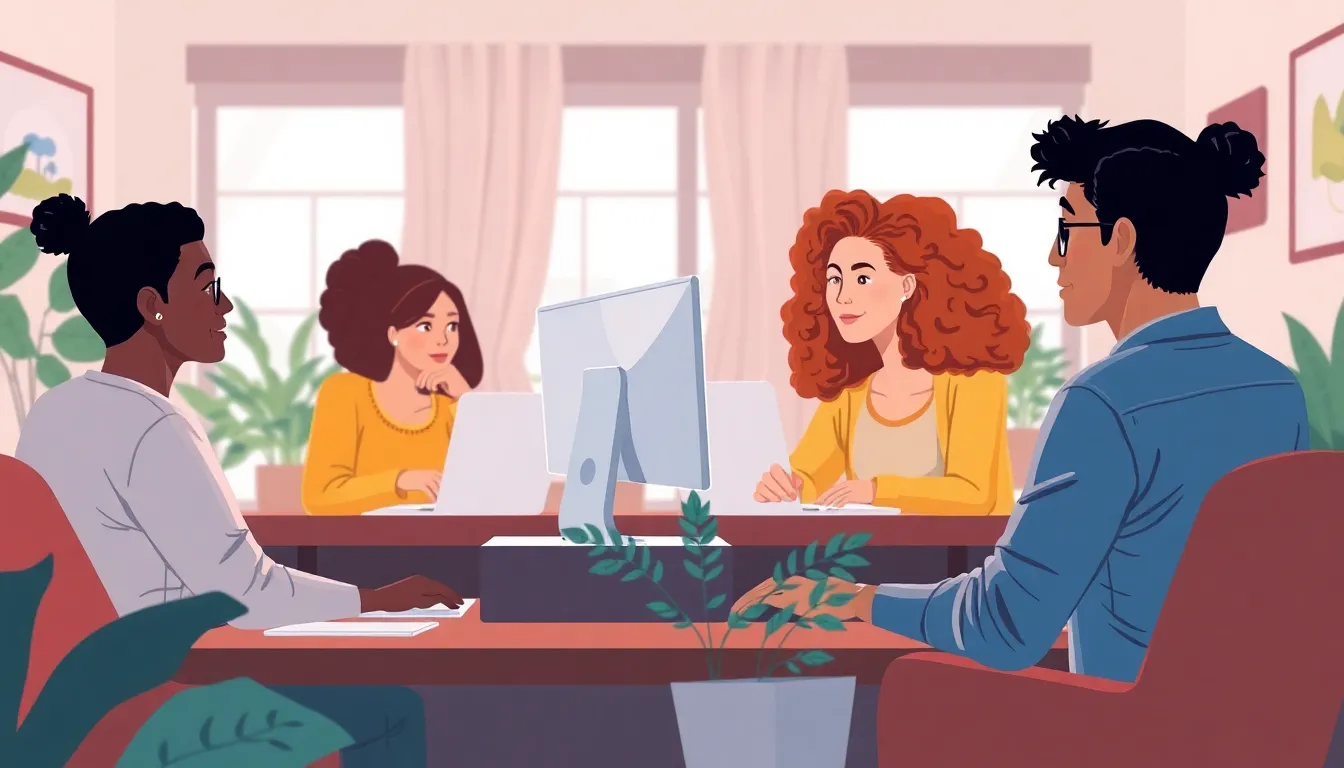Table of Contents
ToggleIn a world where pajamas are the new business casual, virtual therapy is stepping up as the perfect solution for mental wellness. Picture this: you can spill your thoughts to a trained professional without ever leaving your couch. No more awkward waiting rooms or pretending to read outdated magazines. Just you, your therapist, and the comforting glow of your laptop screen.
Virtual therapy offers flexibility and accessibility like never before. Whether you’re juggling a busy schedule or just prefer to keep your therapy sessions in your living room, it’s a game changer. With a click of a button, support is right at your fingertips. So why not trade in those uncomfortable chairs and traffic jams for a cozy blanket and a cup of tea? Embrace the future of mental health care and discover how virtual therapy can help you thrive.
What Is Virtual Therapy?
Virtual therapy refers to mental health counseling delivered through digital platforms. Many therapists use video calls, phone calls, or messaging applications to connect with clients. This approach allows individuals to access professional support from their own homes.
Convenience plays a key role in the appeal of virtual therapy. Clients no longer need to travel to appointments or sit in waiting rooms, saving time and reducing stress. Flexibility is another advantage, as many therapists offer extended hours, accommodating different schedules.
A variety of platforms are available for virtual therapy sessions. Popular options include Zoom, Skype, and dedicated mental health applications that prioritize confidentiality. These tools ensure secure communication between clients and therapists while providing a user-friendly experience.
Research supports the effectiveness of virtual therapy. Studies show that many individuals experience similar outcomes with online therapy as they do with in-person sessions. This evidence encourages wider acceptance and utilization of virtual counseling methods.
Individuals facing barriers to traditional therapy can especially benefit from virtual therapy. People in rural areas or those with mobility issues find it easier to seek help through online platforms. The diverse range of therapists available online also increases access to various specialties and approaches.
Clients engaging in virtual therapy often appreciate the level of comfort it provides. Speaking from a familiar environment can reduce feelings of anxiety and promote openness. This setting encourages honest conversations without the pressure sometimes felt in physical offices.
Overall, virtual therapy presents a modern solution for individuals seeking mental health support. Its convenience, flexibility, and proven effectiveness mark it as a valuable resource in today’s mental wellness landscape.
Benefits of Virtual Therapy

Virtual therapy offers numerous advantages that contribute to its growing popularity. Accessibility and convenience stand out as primary benefits of engaging with mental health professionals through digital platforms.
Accessibility and Convenience
Accessibility defines virtual therapy. Clients gain entry to mental health support from any location using devices like smartphones or computers. Individuals in remote areas or those with mobility challenges particularly find this approach beneficial. Engaging in sessions from home eliminates travel time and associated stress, allowing for a more relaxed experience. Scheduling flexibility further boosts convenience, as many therapists accommodate varied hours to fit different lifestyles. Clients can often choose appointment times that work best for them, making mental health care more attainable.
Cost-Effectiveness
Cost-effectiveness highlights another significant advantage of virtual therapy. Many providers offer lower fees for online sessions compared to traditional in-person visits, reducing overall mental health care expenses. Insurance plans frequently cover virtual therapy, making it an affordable option for many individuals. The elimination of travel costs also contributes to financial savings. Moreover, clients might avoid missed workdays or childcare costs associated with attending in-person sessions. These financial advantages encourage more people to seek help, supporting their mental health without breaking the bank.
Challenges of Virtual Therapy
Virtual therapy presents several challenges that may hinder its effectiveness for some individuals. These obstacles often relate to technology and the nuances of personal interactions.
Technology Barriers
Accessing virtual therapy requires reliable technology. Individuals lacking a stable internet connection may experience disruptions during sessions. Some clients struggle with using certain platforms or devices, which can create frustration. Security concerns also arise regarding confidentiality and data protection. Mental health professionals must ensure that the platforms they use comply with privacy regulations. Additionally, not everyone possesses the technical skills to navigate digital tools effectively. Ineffective technology can diminish the overall experience of virtual therapy.
Lack of Personal Touch
Therapeutic relationships thrive on connection and empathy. Virtual settings can sometimes limit the emotional nuance present in face-to-face interactions. Non-verbal cues, such as body language and eye contact, may become harder to perceive during online sessions. Clients often feel less engaged or connected without in-person presence. A lack of physical interaction can hinder the development of trust, which is vital to the therapeutic process. These factors may lead some individuals to prefer traditional therapy over virtual options despite the convenience it offers.
Effectiveness of Virtual Therapy
Virtual therapy demonstrates significant effectiveness in addressing mental health needs. Research findings consistently indicate that clients experience comparable outcomes from virtual therapy as they do from in-person sessions.
Research Findings
Many studies reveal that virtual therapy yields similar success rates to traditional therapy. A meta-analysis published in the journal Psychological Bulletin found that online therapy is effective for various conditions, including anxiety and depression. Approximately 80% of participants reported satisfaction with their virtual sessions. Additional surveys show that clients often appreciate the ease of accessing mental health support without the constraints of travel. These findings suggest that virtual therapy not only meets client needs but also fosters positive therapeutic experiences.
Comparison with Traditional Therapy
When comparing virtual therapy with traditional therapy, several advantages emerge. Virtual sessions often offer greater convenience, allowing clients to schedule appointments flexibly. Many individuals prefer the comfort of their homes, which can lead to greater openness during discussions. Traditional therapy, however, remains a preferred choice for those valuing face-to-face interactions. Prospective clients may perceive the personal touch in physical settings as essential for building trust. Ultimately, both approaches have their merits, yet virtual therapy’s accessibility and flexibility frequently make it a favored alternative.
Types of Virtual Therapy
Virtual therapy encompasses various formats, each tailored to meet different needs. The main types include video conferencing therapy and text-based therapy.
Video Conferencing Therapy
Video conferencing therapy offers real-time interaction through platforms like Zoom or Skype. Clients engage face-to-face with therapists, mimicking the traditional therapy setup. This format fosters a stronger connection, enhancing non-verbal cues and emotional engagement. Many therapists provide flexibility in scheduling, accommodating individual preferences. A study in the journal Psychological Bulletin found about 80% of participants expressed satisfaction with video sessions. The convenience of accessing support from home eliminates the stress of traveling to appointments. Overall, video conferencing therapy serves as an effective and accessible option for many individuals seeking support.
Text-Based Therapy
Text-based therapy uses messaging applications or specialized platforms to communicate asynchronously. Clients may send messages whenever they feel comfortable, allowing for reflection before responses. This format is particularly beneficial for those who prefer writing over verbal communication. It offers flexibility in expressing thoughts and feelings at one’s own pace. Research indicates that text-based therapy can be effective for anxiety and depression, making it a valuable alternative. While it lacks face-to-face interaction, text therapy provides a degree of anonymity that appeals to many. The convenience and accessibility of text-based therapy make it an appealing choice for those seeking mental health support.
Virtual therapy has transformed the landscape of mental health care by offering convenient and accessible options for individuals seeking support. With the ability to connect with professionals from the comfort of home clients can prioritize their mental wellness without the barriers posed by traditional therapy settings.
While challenges exist such as technology issues and the desire for personal interaction the benefits of virtual therapy often outweigh these drawbacks. Its flexibility affordability and proven effectiveness make it a compelling choice for many. As more individuals embrace this modern approach to mental health care the future of virtual therapy looks promising, paving the way for a more inclusive and supportive environment for all.





